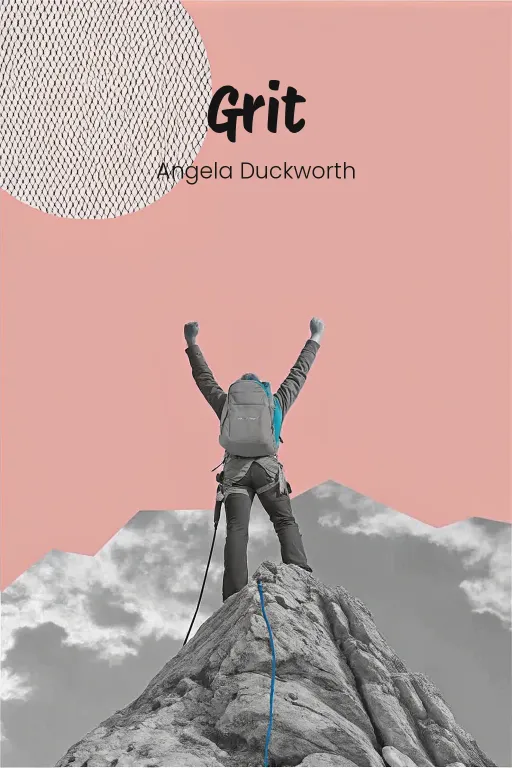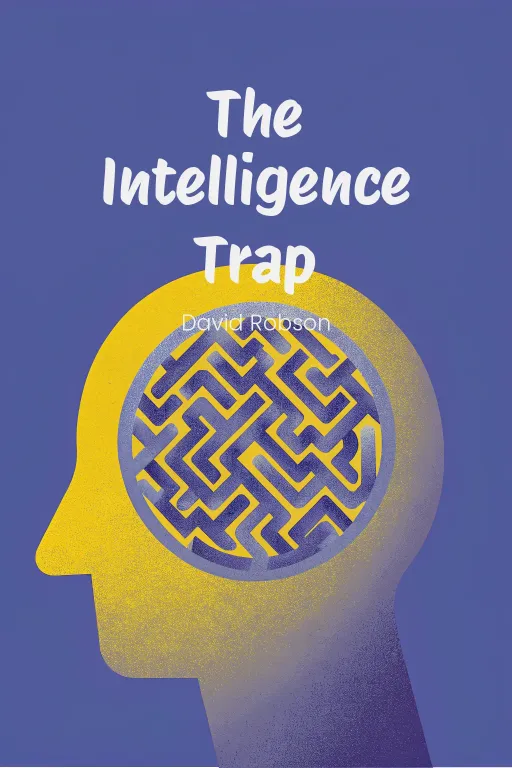
Build Your Potential: It's a Skill, Not a Gift
Podcast by Beta You with Alex and Michelle
The Science of Achieving Greater Things
Build Your Potential: It's a Skill, Not a Gift
Part 1
Alex: Hey everyone, welcome back! Today we're diving into a really interesting question: What if greatness isn't something you're born with, but something you actively build? I mean, whether it's killing it at work, mastering a new skill, making a real impact in your community–what if the real key is just uncovering the potential that's already within you? Michelle: Hmm, intriguing. But let's be real here, Alex–“hidden potential”? It sounds great in theory, very inspirational-poster-ish, but how does that actually translate into the daily grind, you know? Alex: That’s a totally fair question, Michelle, and it's exactly what we're going to explore today. We're taking a closer look at Adam Grant’s compelling book, “Hidden Potential: The Science of Achieving Greater Things.” And honestly, it really flips the script on traditional ideas about talent and success. It basically argues that greatness isn’t about where you start, but how you grow and, even more importantly, the systems that support that growth. Michelle: Okay, so we're talking less about some kind of innate gift and more about actively building skills and creating opportunities. I like that idea. Though, I’m already sensing we’re about to unravel some pretty big concepts here. Alex: Definitely. And Grant does it beautifully, I think, through really vivid stories and solid research. He talks about everything from Navy leaders who turned adversity into triumph—like the Golden Thirteen—to cutting-edge education practices showing how equity fuels excellence. It’s about gearing up for progress, not perfection, you know? Michelle: Alright, so what's the plan of attack for today? What are the main takeaways we're hoping to give our listeners? Alex: We'll uncover the science of achieving greater things through three key lenses. First, we’ll break down the core skills, things like adaptability and resilience—those essential traits that shape how we respond to life’s inevitable challenges. Michelle: Right, the skills you wish they taught more consistently in schools, honestly. What's next on the list? Alex: Second, we’ll tackle motivational scaffolds. These are the things that turn even the most mundane routines into something meaningful, you know, a passion even. A major factor in keeping us on track, especially when the going gets tough. Michelle: Got it – so, making hard work bearable, essentially. I'm definitely going to pull out my inner skeptic for this one. And the third aspect? Alex: The systems! Grant dives into how rethinking our existing structures—education systems, workplaces, leadership styles—can create opportunities where they didn’t seem to exist before. Michelle: So, we’re connecting the dots, then, from developing the individual to fixing the bigger picture. I like the ambition there. Let’s see how it all ties together. Alex: Exactly. Whether you’re looking to grow personally or, you know, contribute to something bigger, this episode is packed with insights on unlocking “hidden potential”. So, let’s get started, shall we?
Skills of Character
Part 2
Alex: Okay, so now that we've set the scene, let's dive into what Grant calls the foundation for growth: the “Skills of Character.” Think of it as the essential mindset and internal tools we need “before” chasing bigger goals. Michelle: A foundation, eh? So without these traits, everything else—the systems, the strategies—just falls apart, right? So, Alex, what exactly “are” these “character skills”? Alex: Well, Grant identifies them as embracing discomfort, adaptability, and balancing perfectionism with growth. They're the ingredients for resilience, creativity, and persistence. Honestly, they dictate how we handle setbacks and turn them into opportunities. Michelle: Okay, discomfort first, huh? Because let's be real, most people don't wake up thinking, "Yes! Let's maximize discomfort today!" Alex: Exactly! But maybe that's the issue. Let me tell you about Steve Martin. When he started in stand-up in the '60s, it wasn't easy. Critics hated him, audiences heckled him, one review even called him “a booking disaster!” Can you imagine the discomfort of that kind of public failure? Michelle: Yikes! Yeah, most of us would probably quit or hide. So how did Martin keep going and turn that discomfort into something good? Alex: That's the interesting part. Instead of running, Martin leaned in. He redefined discomfort as learning. He focused on writing—which he initially hated—and used failures to improve. It wasn't just about telling jokes; it was about experimenting, refining, and even using silence. Eventually, awkward gaps became moments of comedic brilliance. Michelle: So, discomfort became like a creative bootcamp. Like tearing muscles in the gym to make them grow. But here's the question: Does this only work for someone like Steve Martin, who's obviously persistent, or can anyone do this? Alex: That’s a great question. Martin's story shows a principle anyone can use: reframing. If you see discomfort as an opportunity, not a threat, you unlock its power. It’s actually human psychology: lean into what's hard, instead of resisting it, and you build resilience and skill. Michelle: But doesn't this depend on the stakes? Playing with discomfort is one thing when you're being creative. What about when it's about survival? You know, when failure has serious consequences? Alex: That's where adaptability comes in, and it's a perfect lead-in to the next skill! Take Mellody Hobson, for example. Her childhood was financially unstable, so discomfort wasn't a choice, it was her reality. But instead of being overwhelmed, she learned to pivot and learn from adversity. Michelle: Mellody Hobson, the co-CEO of Ariel Investments, right? She's not just surviving, she's thriving. So, what's her secret? Is it just grit, or is there more to her adaptability? Alex: Definitely more. Hobson's success wasn't just “pushing through;” it was her active learning. When she was put in remedial classes as a kid, she could have been discouraged. Instead, she figured out how to change her learning strategies and really understand the material. Michelle: So, it's not just facing setbacks, it's learning from those experiences and using them as fuel? Alex: Exactly! And mentorship played a huge role. Her mentor, John Rogers, nurtured her interest in finance and emphasized feedback as a way to improve. Adaptability wasn't just natural, it was cultivated through guidance and willingness to change. Michelle: Interesting. The mentorship part, especially. Sounds like adaptability isn't about going it alone, it's about putting yourself in environments—or relationships—that help you grow. Like being a sponge, soaking up lessons wherever you can find them. Alex: That’s a perfect way to put it, Michelle. And it connects to our third skill: balancing perfectionism with growth. The Japanese architect Tadao Ando demonstrates this beautifully through his philosophy, rooted in wabi-sabi. Michelle: Ah, wabi-sabi—the Japanese principle of embracing imperfection, right? I like the idea, but how does imperfection fit into personal growth? Alex: For Ando, imperfection isn't a flaw; it's part of the process. Instead of creating perfect structures, he uses materials like concrete that show their natural texture. His work celebrates imperfection, reminding us that growth is messy, and that’s okay. Michelle: Growth is messy? Try telling Instagram that! But I see what you’re saying. Chasing perfection often makes people avoid risks, while embracing imperfection opens the door for creativity. Alex: Exactly. Perfectionism, when unchecked, stops experimentation because it makes us afraid of mistakes. Ando’s work flips that. It shows that flaws can add richness and depth—not take away from it. That's a lesson we can all use: progress isn’t about flawless execution; it’s about learning along the way. Michelle: Which, I guess, ties back to those strategies Grant mentions, like iterative practice or creating feedback-friendly environments. These tools let us practice imperfection in a way that builds confidence instead of breaking it. Alex: Spot on! Together, these skills—embracing discomfort, adaptability, and balancing perfectionism—form the core of personal growth. They equip us to not just face challenges, but grow stronger because of them.
Structures for Motivation
Part 3
Alex: Building on those skills, we're going to talk about structuring motivation now, to help us really power through obstacles. Michelle: Alright, Alex, so structures for motivation, huh? What are we actually talking about here? Alex: Okay, so you know how we talked about resilience and adaptability? Those personal skills are super important, but external structures actually shape how sustained our motivation can be. Think systems, routines, communities. Things that turn a short burst of inspiration into real, lasting commitment. It's about connecting your own effort to a supportive environment. Michelle: So, it's not just 'grit your teeth and push through'? Motivation is actually built into the systems we create around ourselves? Alex: Precisely! Willpower might get you through one marathon, but systems are what allow ultra-marathoners to run for days. Grant illustrates this with stories of systems acting like these incredible motivation engines. Take Evelyn Glennie, for example, that profoundly deaf percussionist who just blew everyone away. Michelle: Oh, I think I know her story! She "feels" the music somehow, doesn't she? Alex: Yes, but it goes much deeper than that. Yes, Evelyn’s motivation thrived because of how her teacher, Ron Forbes, built a new learning system for her. He didn't try to teach her using hearing cues. Instead, he helped her interpret vibrations through her entire body. Evelyn wasn't just learning notes; she felt them through her skin, her bones, everything! That completely reimagined structure turned something monotonous into something deeply engaging and emotional. Michelle: So, instead of seeing her deafness as a barrier, they rebuilt how she experienced music. It's like alchemy, turning boring repetition into absolute passion, that's amazing! Alex: Exactly! And it's not just musicians. Stephen Curry, the basketball superstar, uses the same ideas in his training. Of course, his success is based on relentless practice, but Brandon Payne, his trainer, completely changed how they framed those drills. Michelle: Ah, Curry, the guy who makes impossible three-pointers look like a walk in the park. So what's his system? Alex: It's called "deliberate play." Payne adds playful, game-like elements to his practice. Curry might play modified games, like "Twenty-One," but with obstacles added, like hurdles between shots to simulate the fatigue he feels in a real game. This turns routine drills into inventive puzzles, keeping Curry engaged every step of the way. Michelle: Sneaky but genius. Make it fun, and you forget you're working! It reminds me of gamification in education – setting up challenges to make kids want to learn. Alex: Yes! And that lines up with the research that shows intrinsic motivation thrives when challenges are both personal and enjoyable. Motivation isn't about just hard work; it's about making that work feel meaningful. Michelle: All these systems sound great, but what happens when they fail? What do you do when you just... hit a wall? Alex: That's where creative detours come in, literally! Take R.A. Dickey, the baseball pitcher, who totally reinvented himself after a career slump. Michelle: Wait a minute, is this the guy who climbed Mount Kilimanjaro for "fun"? Alex: The very same! He was struggling; his pitching skills weren't improving. Instead of just pushing harder, he stepped away and took on this crazy challenge: summiting one of the highest mountains in the world. Michelle: Let me guess––the climb wasn't just physical; it was psychological, right? Alex: Bang on. The adversity he faced—altitude sickness, brutal weather—forced him to see the struggle in a new way. It became a kind of metaphor for his career. He realized that breaking through challenges requires, yes, persistence, but also sometimes a strategic reset. When he came back to baseball, he basically transformed his approach and became an elite knuckleballer. Michelle: Dickey basically hit a mental "reset" button? Climbing Kilimanjaro cleared out the mental clutter he couldn't shake on the field. Alex: Exactly. We can all use that principle: sometimes, distancing ourselves from a problem can give us the perspective we need to solve it. Creative detours refresh our energy, and give us breakthroughs we wouldn't have reached grinding through the same old routine. Michelle: Okay, but let's get practical. Can you give concrete tools? I don't see every listener scaling Kilimanjaro next weekend. Alex: A fair point! That's where side projects come in. Think hobbies or new challenges – learning an instrument or trying abstract painting. They can stimulate creativity and shake off feelings of stagnation. And celebrating small wins all along the way is key! Michelle: I see. It's like a long race—breaking it down into manageable stages helps you keep going, instead of getting fixated on how far you still have to go. Alex: Precisely. And speaking of moving forward, let's discuss how we can move forward with the support of others. The story of the Golden Thirteen is such a powerful example of this. Michelle: Ah, the first group of Black Navy officers during WWII. I know they faced huge obstacles – not just really tough studies, but blatant racism. "Tough" doesn't even begin to describe that. Alex: True, but what's amazing is HOW they overcame these obstacles... together. Instead of competing, they turned their training into a collaboration. They shared their strengths, studied together, and pretty much lived as a unit. Michelle: So they created their own scaffolding. Where the system failed, they built their system. That's incredibly powerful. Alex: Exactly. Peer learning and mutual accountability became almost secret weapons. They proved everyone wrong when all thirteen passed their training, earning a place in history, and opening doors for every generation to follow. Michelle: It's such a testament to the power of community. When formal systems don't support you, teaming up with like-minded people can make all the difference. Alex: Right. And that is a reminder that motivation isn’t just about what goes on within us; it's about the village around us. Create environments that encourage collaboration, mentorship, and mutual accountability – these build safety nets to keep people motivated, even through really really tough challenges. Michelle: To sum this up: motivation thrives with the right structures. Whether that’s turning something mundane into joyful creativity, stepping away to reset, or finding a supportive community, it's clear that success doesn't happen in isolation. Alex: Precisely! Structured systems of motivation transform simple ambition into extraordinary achievements. Whether it's Evelyn Glennie's vibrational connection to music, Stephen Curry's gamified drills, or the Golden Thirteen's unified front, there's a common thread: external systems empower us to uncover potential we don't even know we have. Michelle: And that’s the key— success isn't about sheer willpower alone. It's about cultivating environments where you will simply thrive, even when the odds seem impossible.
Systems of Opportunity
Part 4
Alex: So, with our personal and motivational frameworks sorted, we can zoom out to the systems around us, right? The stuff that either opens doors or slams them shut. Michelle: Right, so we're going from individual grit to societal structures—how they either help or hinder someone's potential. I'm picturing, like, a satellite view of opportunity. Alex: Precisely. This is about how things like education, talent evaluation, and all those societal frameworks can either stifle or boost potential. It ties back to what we were saying about that personal growth and motivation, but now we’re seeing how it all fits into the bigger picture. Michelle: Okay, I’m tracking. So, where do we even begin to tackle something this huge? Alex: Well, let's start with one of the most transformative areas: education. And honestly, you can’t talk about this stuff without mentioning Finland's education system. Michelle: Finland, yeah—the gold standard. But, I'm guessing it's not just about the kids acing math and science, is it? Alex: Not at all. It’s the system they have. Finland operates on this principle: “We can’t afford to waste a brain.” Which leads to practices aimed at unlocking every student’s potential, no matter where they start. And one of their key strategies is called "looping." Michelle: Looping? Sounds a bit buzzword-y. What does that actually involve? Alex: It's pretty simple, actually. Looping just means that a teacher stays with the same group of students for multiple years. They get to know each student really well—not just academically, but their learning styles, their struggles, the whole picture. It builds trust and lets the teacher really tailor the learning. Michelle: So, instead of starting from scratch every year with a new teacher, there's continuity. Like having a coach who knows how you perform in crunch time, not just your stats. Alex: Exactly! That trust is crucial. Imagine a kid struggling with math. In a traditional system, that struggle might get overlooked, right? But with looping, the teacher has the time and context to spot the challenge and personalize strategies, year after year if necessary. Michelle: That makes sense. But there's gotta be more to it than just teacher continuity, right? What else are they doing? Alex: Play-based learning, especially in the early years. Rather than diving straight into hardcore academics, they focus on curiosity and collaboration. The thinking is, kids who enjoy learning early on are more likely to stay engaged. Michelle: So, ditch the high-pressure standardized-test madness that most systems are obsessed with? Alex: Exactly! It's not about comparing kids to some benchmark. It’s about making sure every child thrives—academically, socially, emotionally. It's no surprise they have one of the narrowest achievement gaps and high levels of student well-being. Michelle: It's wild, isn't it? Proving that equity doesn’t mean lowering the bar, it means lifting everyone up. Though I wonder, could these principles actually work in more competitive, resource-strapped systems? Alex: That's the challenge. But even in tough systems, we can learn lessons—like prioritizing teacher development and creating more inclusive practices. Finland proves that an equitable framework helps everyone thrive, not just individuals; it strengthens all of society. Michelle: Okay, education's one system where equity matters big time. What about in the workplace, where talent is scouted—or often overlooked? Alex: Good question. That’s where we look at fairer systems of talent identification. Take José Hernández, the migrant farmworker who became a NASA astronaut. His story reveals how flawed traditional measures of talent can be and why we need to value resilience and growth. Michelle: Right, Hernández, the guy who applied to NASA fifteen times! Talk about persistence. What does his journey say about talent itself? Alex: It says that the way we usually measure talent often excludes folks like Hernández. Traditional systems, like test scores or academic records, focus on past achievements. They reward those who already have resources and support. But Hernández’s story shows the value of seeing qualities like perseverance, adaptability, and relentless self-improvement. Michelle: Right, and I imagine "future astronaut" wasn't exactly what NASA saw when they looked at his background. Alex: Not at all. Born to Mexican immigrant parents, Hernández grew up working in farm fields. He didn’t speak English when he started kindergarten! Huge hurdles just to keep up. But he fell in love with space when he watched the moon landing in '72, and he never let go. Michelle: But the odds must have been astronomical. Going from picking crops to piloting spacecraft? Alex: Grit and smart goal-setting. With every NASA rejection, he reflected on what was missing—experience, skills—and figured out how to get it. He got new certifications, sought mentors, even learned diving and piloting to demonstrate his commitment. Michelle: So, every "no" became a roadmap. There's something poetic about that. But what if NASA had systems to recognize growth trajectories instead of just checking boxes? Alex: Exactly my point. People are starting to talk about things like Grade Point Trajectory (GPT), that focuses on improvement over time. Rewarding progress and effort instead of rewarding privileges someone started with. Michelle: I like that—recognizing that upward climb. But let’s be real; most institutions love their rigid metrics. How do we push them to consider growth and resilience instead? Alex: By integrating more holistic assessments. Adding exercises that test resilience or problem-solving skills, for example, or giving feedback that focuses on how candidates respond over time. It’s not just about uncovering potential, it’s about levelling the playing field. Michelle: A level playing field sounds great in theory. But in practice, we're fighting systems that resist change, right? Alex: True, but these examples—Finland's education system, Hernández’s NASA journey—they give us a roadmap, right? They show us the potential that's waiting if we're willing to reimagine how we evaluate talent. Not easy, but possible. And the benefits? Not just for individuals, but for entire communities when everyone gets a fair shot. Michelle: So, when we talk about "hidden potential," we're really saying it's not hidden at all. It's just buried under systems that aren't designed to see it. Fix the system, and suddenly, potential becomes a lot less hidden. Alex: Exactly. That’s the transformation we’re aiming for—not just for individuals but for society as a whole. It all starts with these systems of opportunity.
Conclusion
Part 5
Alex: So, today we really dove into this idea of hidden potential, and hopefully we've shown it's not some magical, inborn talent, right? It’s much more about personal growth, consistently staying motivated, and, crucially, having fair systems in place. We discussed cultivating those essential “character skills,” like getting comfortable with being uncomfortable, being adaptable, and finding that sweet spot with perfectionism. Michelle: Exactly. And we also saw how motivation isn't just about sheer willpower, is it? I mean, it really flourishes when it’s supported by good structures. Think about Evelyn Glennie “feeling” music, Stephen Curry finding joy in drills, or the Golden Thirteen building strength through teamwork. All these examples highlight the importance of having the supporting structures, you know? Alex: That's right. And we also touched on how supportive systems, like Finland’s education system or José Hernández’s road to NASA, can really unlock potential simply by rewarding resilience and growth, rather than just focusing on fixed metrics. Michelle: So, here's the main thing: greatness isn’t something you're just born with, predetermined. It’s constructed, piece by piece, through dedicated effort, the right support, and fair environments that allow everyone a chance. Alex: Precisely! And for our listeners, something to consider is this: What little tweaks can you make, either in your own life or within the systems you’re part of, to help bring out the hidden potential in someone? It could be your own potential, of course, or someone else's. Michelle: Yeah, because ultimately, this isn't just about personal achievement. I mean, the real magic happens when we create avenues for collective growth, right? Alex: Absolutely. Thanks for tuning in with us. Until next time, keep pushing yourselves, keep building those supportive systems, and keep unlocking that hidden potential!









